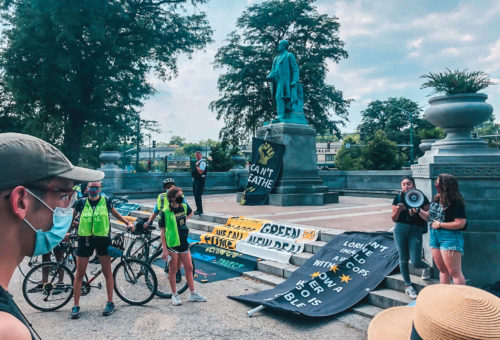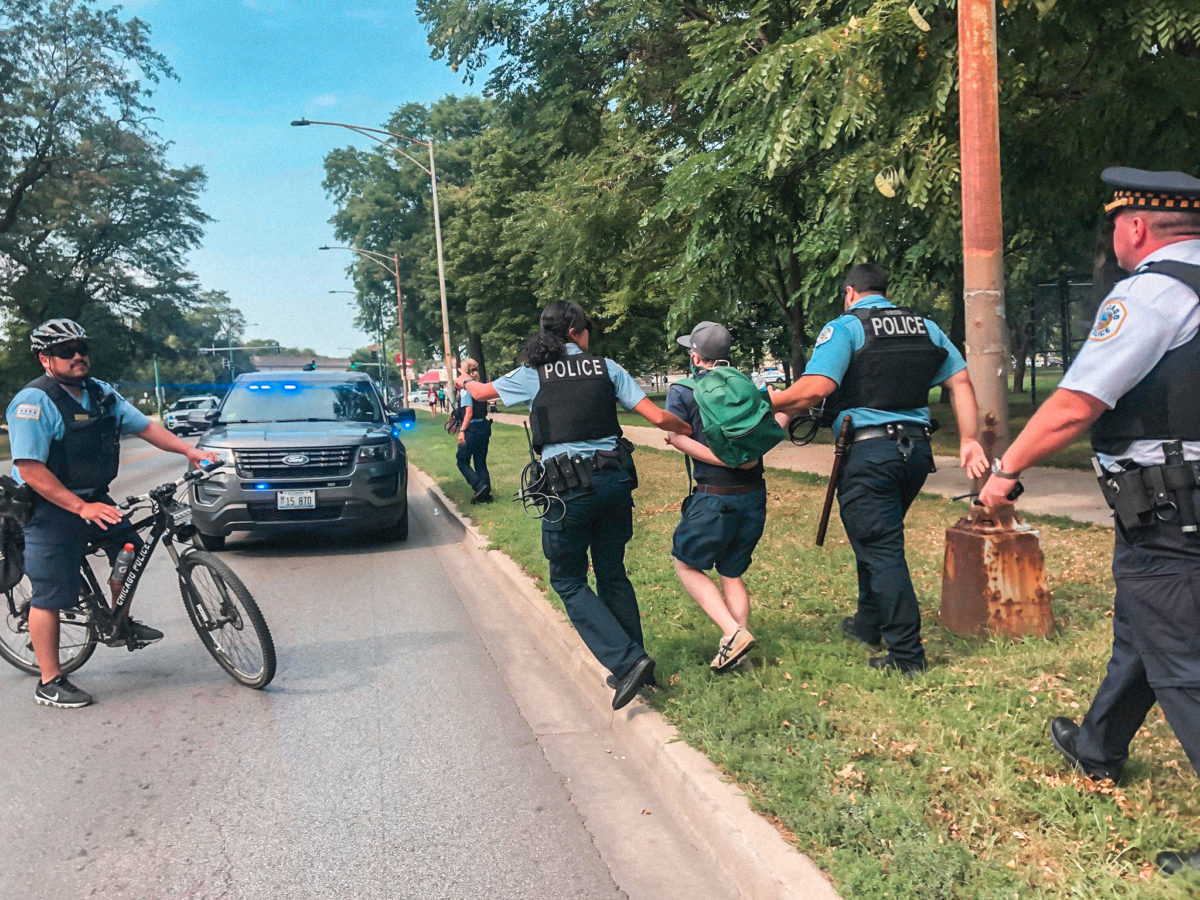On August 15, the city saw a glimpse of two possible futures for Chicago. In one, riot police clashed with protesters in the shadow of raised bridges that walled off the Mag Mile. In the other, a coalition of activists mobilized on the South Side to resist environmental injustice and envision a world free from pollution, policing, and incarceration.
The coalition, composed of community and youth-led environmental organizations, came together in McKinley Park to demand the defunding of CPD and envision the decade of the Green New Deal. This action was part of an ongoing campaign to shut down MAT Asphalt, a two-year-old asphalt plant at Pershing Rd. and Damen Ave. that residents say is filling their community with pollution. The campaign also demands Mayor Lori Lightfoot fulfill her campaign promise to create a Department of Environment.
The organizations included the Chicago chapter of Sunrise Movement, the 12th Ward IPO, Neighbors for Environmental Justice, and the Southwest Environmental Alliance, a coalition that has raised concerns for two years about the MAT Asphalt plant spewing pollutants in McKinley Park. Since the onset of the novel coronavirus pandemic, the coalition has escalated its campaign to pressure the city to shut the plant down.
The protest of about one hundred people was an exercise in imagination. Leaders asked attendees to meditate and imagine a world with clean air and freedom from police brutality. They sang, drew, and asked community members to write inspiring messages in chalk.
Speakers demanded that resources currently allocated to policing be instead put toward environmental remediation and the health of South Side communities.
“My group is here today [because] we know how money flows from companies to the city and back again. Prioritizing profits over people and prioritizing private companies over the health and safety of Chicagoans,” said Neighbors for Environmental Justice organizer Alfredo Romo. “But let’s be clear, it has always been about property and profit over people to benefit the rich and politically connected.”
The activists also called for the creation of the Civilian Police Accountability Council (CPAC), a proposed elected body that would oversee police rules and regulations and appoint the police superintendent and members of the Police Board.
It appeared that a disproportionate number of police officers were attending the protest, possibly as a precaution to protect the statue of William McKinley, after whom the park is named.
“We researched [McKinley] and I didn’t think he was that controversial, [but] one of our guys found he had something to do with slaves, so we suspected there might be something, but this was largely peaceful,” said Ninth District Commander Don Jerome said of the protest, where an activist was accusing CPD of “babysitting” a statue.
Before McKinley was the twenty-fifth president of the United States, he enlisted in the Union Army. He never owned slaves but as president he went to war with Spain and colonized Cuba, Puerto Rico, the Philippines, and Hawaii. His biggest legacy was imperialism. But his statue was left alone.
The target on Saturday was the MAT Asphalt plant, adjacent to the park, and its impact on the health of neighborhoods across the South Side.
“This is not just about a little asphalt company. We want the asphalt company out, but it’s bigger than that,” said McKinley Park resident Theresa McNamara, of Southwest Environmental Alliance.

That’s where protesters were heading, taking up one side of the street on Western when one person was arrested. Jerome said the protester was arrested for “being in the street when he was told to go on the sidewalk.” The arrested person, Jimmy Rothschild, was charged with misdemeanor obstruction of traffic by a non-motorist.
Rothschild was the only person taken into custody at the largely peaceful protest, but many others were arrested in the city on Saturday. Later that day, Chicagoans would witness police pepper spraying, kettling, and beating protesters in front of the now-common sight of raised bridges downtown.
“The response that the city’s had to what’s happened downtown is the same valuing of property of wealthy white people over the lives and well-being of Black and brown people,” Rothschild said.
McKinley Park is in the 12th Ward, which is represented by alderman George Cardenas, who chairs the City Council’s Health and Environmental Protection Committee. This despite supporting the owner of MAT Asphalt moving into the community as early as February 2017, the Weekly reported, and accepting generous political donations from the Tadin family.
In March, local elected officials including Ald. Byron Sigcho-Lopez, State Senator Tony Munoz, and State Rep. Theresa Mah urged Lightfoot and Gov. JB Pritzker in a letter to use executive powers to stop the operation of the plant, which is currently running on an expired permit. The IEPA indefinitely postponed a public hearing on the plant that was supposed to happen in March.
[Get the Weekly in your mailbox. Subscribe to the print edition today.]
The climate urgency in Chicago has changed this year — but like many urgent issues in Chicago, the effects are disproportionately felt. In April, Hilco’s botched demolition of a smokestack at the Crawford power plant left Little Village covered in dust. That’s the neighborhood with more COVID fatalities than any other Illinois zip code.
In May, two explosions at the General Iron recycling plant resulted in the shut down of the Lincoln Park plant, but have not halted plans to move the plant to the Southeast Side. The pressure on the city to shut down the MAT Asphalt site is coupled with the neighborhood hitting 2,212 confirmed COVID cases.
Cardenas said because two-thirds of the city’s population is Black and brown, “the majority of [industry] is going to fall on Black and brown communities.”
Since she first used the tactic to stifle protests in May, raising the bridges has become a common practice for the city to keep downtown closed off. Rothschild, who lives in Uptown and worked as political director of Matt Martin’s aldermanic campaign last year in the 47th Ward, said it was important for him to defy the division between the North and South Sides to protest pollution and demand environmental justice.
“People from the North Side need to go and stand in solidarity,” Rothschild said. “When these neighborhoods have been disproportionately disinvested [from], to then turn around and talk about looting is ludicrous.”
Last week, Georgetown Philosophy assistant professor Olúfẹ́mi O. Táíwò wrote an article in Dissent Magazine in which he argued that imminent climate crises ahead make imaginative abolitionist demands and community control over decisions more urgent. “The safety and stability of spaces for affluent residents is generated from the very insecurity that their policing creates for others.”
This past weekend Lori Lightfoot showed the world a glimpse of Chicago’s own version of climate apartheid. Environmental activists asked Chicagoans of the South Side to envision a world with clean air and freedom from policing and incarceration. The raised bridges and police violence warn of a different future. These tactics sent a message about who is welcome in their own city, and who gets what in Chicago. For some, clean air and protection of property. For others, pollution and police brutality.
Alexandra Arriaga is a journalist from the Southwest Side currently based in Pilsen, where she lives close to family and a crew of street cats. She is a civic reporting resident at City Bureau. Her last piece for the Weekly was about how Black and Latinx solidarity keeps mouths fed during COVID-19.

